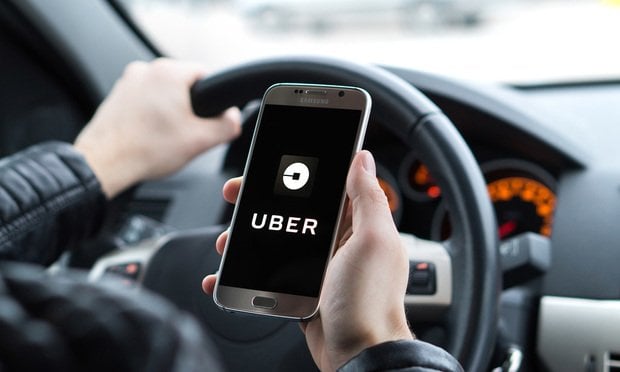
Colombia has ordered Uber to halt its ride-hailing operations in the Andean country in a decision that has sent shivers through technology players in Latin America.
The ruling came down Dec. 20 from the Superintendency of Industry and Commerce, which said that Uber was competing unfairly with taxi services. The app has essentially functioned for years in Colombia in regulatory limbo—the Technology Ministry declared ride-hailing apps legal, while transportation authorities said they were breaking the law.
Critics called the decision illogical, saying it's like forbidding email in an effort to protect the postal service, or blocking cellphone use to shield fixed-line telephones.
"Under this logic, absurdly, they're going to have to suspend Netflix, Airbnb, Amazon and hundreds of other service providers. Technology moves faster than legislation, one must adapt," said David Luna, a lawyer who specializes in administrative law and is a director at Colombian think tank Al Centro.
Apps offer services that make life easier for consumers, Luna argued, not for monopolies.
Uber said it is confident it can eventually reverse the move. At the same time, company officials are concerned that other countries in Latin America may follow suit. Countries such as Brazil, Chile and Mexico have opted to regulate ride-hailing apps, rather than to ban them outright.
The Colombia ban came the same week as a ruling against Uber in Germany, where the company works with licensed private hire vehicle companies in an effort to comply with German transportation law. In November, Uber also lost its license to operate in London.
Uber said in a statement that it has appealed the decision in Colombia, which it believes violates due process and contradicts the government's professed desire to promote innovation and entrepreneurship. The company has been in Colombia for six years.
At least 2 million Colombians use the service, which relies on more than 88,000 drivers. Just in the past 18 months, Uber said its services have generated more than 70 billion pesos ($21 million) in tax revenue for the government.
Colombia has been a hotbed for startup activity. The country of 49 million people has proven to be an apt testing ground for apps and new internet services, despite having the lowest broadband internet penetration of any country in the OECD.
The country produced investor sensation Rappi, a delivery service for restaurant takeout food and groceries that has spread to seven other countries in Latin America. Japan's SoftBank injected $1 billion into Rappi in May, giving it a majority stake in the startup.
Rappi has also faced regulatory heat in Colombia. In September, the Superintendency said it had launched an investigation into Rappi for possible violations of consumer rights.
The battle with Uber, though, has been particularly antagonistic. The Superintendency fined the company $2.1 billion pesos ($632,000) in August for alleged obstruction. The regulator also took the unusual step of fining two of the company's legal advisers, and naming them publicly.
The lawyers, the regulator said, gave evasive and incomplete statements about their responsibilities within the company, as well as about the corporate structure of Uber in Colombia. Employees did not allow inspectors to access internal documents or archives on computers, the Superintendency said.
Taken together, the regulatory scrutiny of Uber and Rappi paint a daunting picture for tech startups operating in Colombia. But they also reflect the criticisms emerging around the world about jobs in the gig economy that dodge contributions to social security systems for workers and gain a competitive edge by not paying for licenses, permits and taxes often borne by incumbents in the marketplace.
NOT FOR REPRINT
© 2025 ALM Global, LLC, All Rights Reserved. Request academic re-use from www.copyright.com. All other uses, submit a request to [email protected]. For more information visit Asset & Logo Licensing.
You Might Like
View All

'Pull Back the Curtain': Ex-NFL Players Seek Discovery in Lawsuit Over League's Disability Plan

Sanctions Order Over Toyota's Failure to Provide English Translations of Documents Vacated by Appeals Court
4 minute read
Apple Agrees to Pay $95 Million Settlement in Siri Voice Assistant Privacy Class Action
Trending Stories
- 1Restoring Trust in the Courts Starts in New York
- 2'Pull Back the Curtain': Ex-NFL Players Seek Discovery in Lawsuit Over League's Disability Plan
- 3Tensions Run High at Final Hearing Before Manhattan Congestion Pricing Takes Effect
- 4Improper Removal to Fed. Court Leads to $100K Bill for Blue Cross Blue Shield
- 5Michael Halpern, Beloved Key West Attorney, Dies at 72
Who Got The Work
Michael G. Bongiorno, Andrew Scott Dulberg and Elizabeth E. Driscoll from Wilmer Cutler Pickering Hale and Dorr have stepped in to represent Symbotic Inc., an A.I.-enabled technology platform that focuses on increasing supply chain efficiency, and other defendants in a pending shareholder derivative lawsuit. The case, filed Oct. 2 in Massachusetts District Court by the Brown Law Firm on behalf of Stephen Austen, accuses certain officers and directors of misleading investors in regard to Symbotic's potential for margin growth by failing to disclose that the company was not equipped to timely deploy its systems or manage expenses through project delays. The case, assigned to U.S. District Judge Nathaniel M. Gorton, is 1:24-cv-12522, Austen v. Cohen et al.
Who Got The Work
Edmund Polubinski and Marie Killmond of Davis Polk & Wardwell have entered appearances for data platform software development company MongoDB and other defendants in a pending shareholder derivative lawsuit. The action, filed Oct. 7 in New York Southern District Court by the Brown Law Firm, accuses the company's directors and/or officers of falsely expressing confidence in the company’s restructuring of its sales incentive plan and downplaying the severity of decreases in its upfront commitments. The case is 1:24-cv-07594, Roy v. Ittycheria et al.
Who Got The Work
Amy O. Bruchs and Kurt F. Ellison of Michael Best & Friedrich have entered appearances for Epic Systems Corp. in a pending employment discrimination lawsuit. The suit was filed Sept. 7 in Wisconsin Western District Court by Levine Eisberner LLC and Siri & Glimstad on behalf of a project manager who claims that he was wrongfully terminated after applying for a religious exemption to the defendant's COVID-19 vaccine mandate. The case, assigned to U.S. Magistrate Judge Anita Marie Boor, is 3:24-cv-00630, Secker, Nathan v. Epic Systems Corporation.
Who Got The Work
David X. Sullivan, Thomas J. Finn and Gregory A. Hall from McCarter & English have entered appearances for Sunrun Installation Services in a pending civil rights lawsuit. The complaint was filed Sept. 4 in Connecticut District Court by attorney Robert M. Berke on behalf of former employee George Edward Steins, who was arrested and charged with employing an unregistered home improvement salesperson. The complaint alleges that had Sunrun informed the Connecticut Department of Consumer Protection that the plaintiff's employment had ended in 2017 and that he no longer held Sunrun's home improvement contractor license, he would not have been hit with charges, which were dismissed in May 2024. The case, assigned to U.S. District Judge Jeffrey A. Meyer, is 3:24-cv-01423, Steins v. Sunrun, Inc. et al.
Who Got The Work
Greenberg Traurig shareholder Joshua L. Raskin has entered an appearance for boohoo.com UK Ltd. in a pending patent infringement lawsuit. The suit, filed Sept. 3 in Texas Eastern District Court by Rozier Hardt McDonough on behalf of Alto Dynamics, asserts five patents related to an online shopping platform. The case, assigned to U.S. District Judge Rodney Gilstrap, is 2:24-cv-00719, Alto Dynamics, LLC v. boohoo.com UK Limited.
Featured Firms
Law Offices of Gary Martin Hays & Associates, P.C.
(470) 294-1674
Law Offices of Mark E. Salomone
(857) 444-6468
Smith & Hassler
(713) 739-1250








